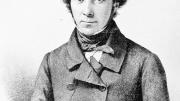Two momentousjourneys began in 1831: the young Alexis de Tocqueville left Le Havre for the United States on April 2, and the still younger Charles Darwin set sail on the Beagle in December while the Frenchman toured the Mississippi. In Tocqueville's Discovery of America (Farrar, Straus and Giroux, $27), Bernbaum professor of literature Leo Damrosch recalls the young explorer who later wrote, “In America I saw more than America; I sought there an image of democracy itself…”—his origins, his traveling companion Gustave de Beaumont, and the young nation they explored. From the preface:
Tocqueville met and questioned hundreds of Americans on his journey, some famous—Daniel Webster, John Quincy Adams, Sam Houston—and some obscure; many important ideas in Democracy in America were originally suggested by people he talked with. He wrote to his brother after his first few weeks in New York, “Ideas come in, as it were, through our pores, and we learn as much in drawing rooms or taking walks as when we’re shut up in our study.” He soon discovered that whereas in Europe it was impolite to ask probing questions, the typical American was “a pitiless questioner” and perfectly willing to answer such questions as well as to ask them. As for Tocqueville, Beaumont said about him, “He had the very rare talent of knowing how to listen well just as much as how to speak well.”…
Tocqueville was not just a great listener; he was a man in motion, and it is no accident that he found his way to his masterpiece by traveling. Beaumont especially admired the energy with which his friend pursued his quest. “Repose was contrary to his nature, and even when his body wasn’t moving, his intelligence was always at work…The slightest loss of time was unpleasant to him.…” He was interested in everything, and tireless in acquiring knowledge. He once told Beaumont, “You are always on fire, but you catch fire for only one thing at a time, with no curiosity or interest for everything else.…I have an ardent and insatiable curiosity that constantly pulls me off my path to the right or the left.”…
Tocqueville was a sensitive, ambitious, and at times troubled young man taking in a nonstop barrage of impressions in a strange land. The America he encountered was no abstract embodiment of democracy, but a turbulent, competitive, rapidly changing society. During the 1830s the nation was still young. It had recently elected its first populist president in Andrew Jackson, it was expanding aggressively westward, and it was deeply conscious of class, regional, and racial tensions, forebodingly aware that civil war might one day tear it apart. This book seeks to bring that traveler and that world to life.…By accompanying him on his journey, we can share in his personal discovery of America during an era of immense significance in the history of our nation, yet one that has received little attention amid the outpouring of books on the Revolution and the Civil War.









